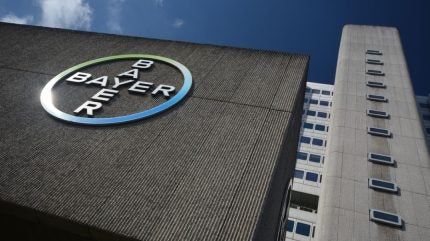
Bayer has announced €13.8 bn ($14.9 bn) in Q1 sales in its latest financial report, largely driven by sales of its prostate cancer therapy Nubeqa (darolutamide) and chronic kidney disease drug Kerendia (finerenone).
The company said the Q1 sales were down 1% from the first quarter of last year, but the reported decline was of 4% because of “foreign exchange headwinds”. The company reported a free cash flow of minus €2.6bn, which is still improved on 2023’s number, largely driven by lower litigation payouts.

Discover B2B Marketing That Performs
Combine business intelligence and editorial excellence to reach engaged professionals across 36 leading media platforms.
The company also confirmed that it had axed 1,500 employees in Q1, with approximately two-thirds of staff being laid off from managerial roles. This move was made to help the company reach its target of sustainable cost savings of €500 million in 2024 and €2bn euros in 2026. Currently, Bayer’s pharmaceutical division consists of 180 teams. CEO Bill Anderson aims to reduce debt and address litigation, partially through a planned amendment to its dividend policy.
As part of its strategic plans for the future, Bayer plans to put its energy and focus into building a strong pharmaceuticals pipeline for the next 24 to 36 months, said Anderson at the recent 5 March Financial News Conference in London.
“We’re seeing additional pressure from generics in some markets in Pharma – even if our team was actually able to manage a slight sales increase for Xarelto in the quarter,” said Anderson.
GlobalData forecasts a US constraining patent expiry for Xarelto in February 2025, opening up the market to more generics.

US Tariffs are shifting - will you react or anticipate?
Don’t let policy changes catch you off guard. Stay proactive with real-time data and expert analysis.
By GlobalDataGlobalData is the parent company of Pharmaceutical Technology.
Bayer and Janssen’s Xarelto (rivaroxaban) is used as a treatment for deep vein thrombosis and pulmonary embolism, and also to reduce the risk of recurrence of both. The US Food and Drug Administration (FDA) first approved Bayer’s blood thinner Xarelto in 2011 for the prevention of deep vein thrombosis in patients undergoing knee or hip replacement surgery. Since the first approval, the FDA has approved six more label expansions for the therapy.
In the UK, Xarelto will soon face generic competition, after a UK High Court revoked a patent for the therapy’s active pharmaceutical ingredient in April 2024. The UK decision followed action from the European Patent Office (EPO), which revoked Bayer’s EP 961 dosage patent for the lack of an inventive step in 2018. However, the EPO reinstated the patent in 2021, giving Bayer European market exclusivity until January 2026. French and South African authorities have also revoked the patent in recent years.
However, Anderson added, “We are still expecting headwinds on Xarelto to increase throughout the year, likely resulting in year-on-year sales declines of the division for the next three quarters to come.” When questioned about the potential breakup of the Bayer group, Anderson said “not now”, adding that the company may be open to the possibility in the future.




